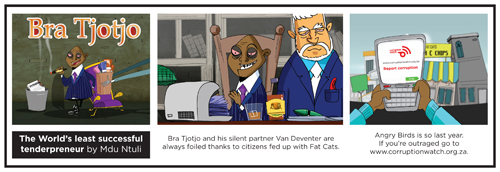
The series, which will play out in six parts on YouTube with links from the Corruption Watch website, Facebook and Twitter, is aimed specifically at getting young people to take a stand against corruption by reporting it.
The first instalment, appropriately titled Something Fishy, has already been posted on Corruption Watch’s YouTube channel to get South Africans in the mood for the United Nation’s Anti-Corruption Day on Sunday, 9 December
The second part of the series will be posted next week, and from thereafter once a month.
Bra Tjotjo and Van Deventer
Ntuli has developed two highly relatable characters for these special-edition animations: there’s the world’s least successful tenderpreneur, Bra Tjotjo, and his silent partner Van Deventer – together, they’re always on the look-out for the next scam, with a little inside help from a corrupt government official.
“Mdu Ntuli is one of South Africa's most original and hard-hitting satirists, and we are excited to be partnering with him on the Bra Tjotjo series,” says Corruption Watch executive director David Lewis.
“He has developed a loyal following of 2.5-million viewers on his YouTube channel thanks to fearless commentary that taps into the spirit of our country and our times. We are proud to be supporting young voices like Mdu’s who are already engaging with the negative effects that corruption will have on our future if we don’t take a stand now. This campaign aims to get as many young South Africans on our side as possible.
“We have given Mdu total freedom to create his own stories and characters dealing with issues that he feels are the most important,” says Lewis.
Cartoon characters have been successfully used in other African countries as well as in India to bring issues to life in a way that young people can relate to. But this is the first time in South Africa that an anti-corruption organisation has joined up with a talented young digital story-teller, allowing him to tell his own stories in his own way.
“I think South Africans will relate to the characters. They are greedy opportunists who always end up behind bars thanks to a good citizen who notices their skulduggery, and reports it to Corruption Watch,” says Ntuli. “This is an old cartoon convention that we are giving some fresh legs.”
“Corruption Watch was established because the people of South Africa are fed up with corruption. Judging from the anger of the public, it’s clear that there is a growing awareness that if corruption is going to be tackled, then ordinary South Africans are going to have to become active participants in this struggle,” states Lewis.
Corruption Watch “reporters” are also urged to offer solutions in the manner that business, government, and the public deal with corruption. The organisation has received over 2 800 reports from the public to date. These reports are then handled by the team consisting of lawyers, investigators, researchers, writers and data managers.
“Confronting corruption requires an active and engaged public that is willing to hold to account those who wield public power and those who control public resources, including those in the private sector who supply and often distribute those resources,” says Lewis.
“Those who refuse to respond to the voices of the public will be named and shamed in exactly the same way as those who perpetrate corruption.”

